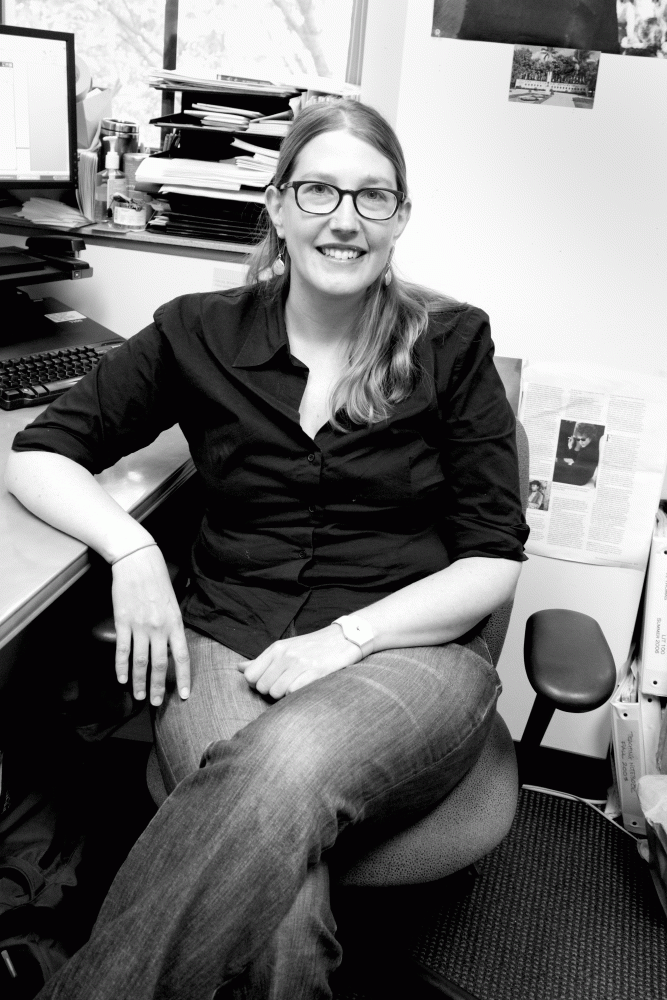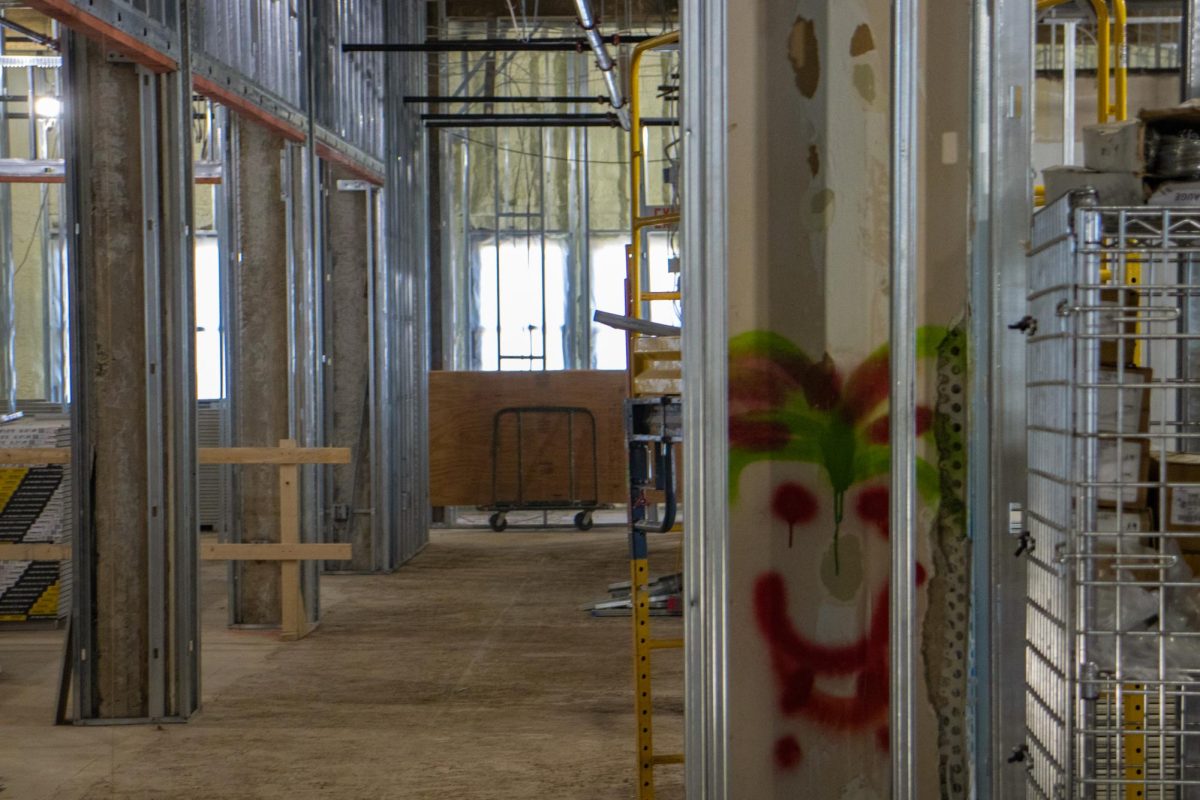Professor Profile: Alison Thomas
December 6, 2012
How did you come to teach at AU?
I did my undergrad at Cornell in English and Spanish. Then I came to AU for the graduate literature department’s MFA in creative writing. The MFA program has a track where you can formally learn about teaching and get your feet wet a bit. When I first started teaching I was a grad student, and when I was first hired I taught a little here and at George Washington in their graduate program. AU hired me full time and this is my fifth year.
Was your career path always clear to you?
Yes and no. I always wanted to be a writer because of how much I loved reading books and telling stories. I always sort of studied those things: writing, storytelling, literature. Being in an MFA program and being in that track solidified that feeling that I should be a writer.
Do you have a favorite topic to teach?
I have a lot of favorites! I love creative nonfiction and all that that means. The term is loaded; it includes everything from memoir and literary journalism and feature stories. I like teaching that range of nonfiction and all the hairy questions that come up for students. In my college writing classes I like teaching pop culture-related things. My spring course is going to be humor-centered and it’ll be open to first year students or anyone with the LIT-100 prerequisite.
What draws you to teaching writing?
I think one of the myths about writing is that it’s an intangible thing that kind of just happens to you. That good writing is inspired and magical. I do think that it can be inspired and magical, but usually it’s a lot uglier than that. I like being involved in that ugliness with my students. My classes challenge them to think outside the box. Everyone can be a writer and everyone can do it well. People think they have it or they don’t. I like helping students feel empowered to supersede that notion.
What is the best thing an aspiring writer could do to improve, outside of the classroom?
Probably a mixture of things. Definitely reading, definitely writing of any kind, for oneself or to others. Asking questions about things that are in others’ or your own writing is one of the best ways. Really, it’s just a practice thing, getting what is in your brain on to paper. The more you do it, the more effective you become as a writer.
What is the inspiration for your book Our People?
That was my thesis project. It’s a fiction book and a collection of short stories, sitting in a drawer now. I’ve become more obsessed with creative nonfiction in the past few years. My most recent publication was in creative nonfiction. This most recent work was really trying to explore what creative nonfiction is, who gets to say what, what is truth and what is lying. What justifies people talking and writing about themselves. The piece is called “A Telescope at the Sky” which was in the journal Fourth Genre. They publish experimental nonfiction; I believe the subtitle is “explorations in nonfiction.” They are really pushing the genre and asking questions about the genre. It’s interesting especially to me because the classes that I teach involve exploring creative nonfiction.
Your experience makes you an obvious match for 826DC. What got you involved with that organization? Can you describe just what you do there?
826 is a nonprofit, they call themselves a literacy nonprofit. DC is just one chapter of a national organization. They have chapters in many different cities, like New York, LA, Boston, Chicago, and its home base is in San Francisco. It was started by Dave Eggers, who wrote A Heartbreaking Work of Staggering Genius and recently the screenplay for Where the Wild Things Are, as a place where kids could go to get tutoring services for homework and also where students could work on their writing skills, specifically. It offers lots of different kinds of programming, workshops and field trips. Volunteers will go into classrooms to support writing curricula for kids of all ages, really. I was interested in it for a number of reasons, especially as a support tool for any teacher to have access to. Public schools sometimes need that support for what students can do after school, so we provide them with some options and support with what they do. I started a year and a half ago. I’ve given workshops for local high school students, like helping them with college applications and the essay. Last school year I worked on a young adult book project at Ballou High School. I worked with another writer in the school and worked with students who were in the poetry club. We met with them weekly, and they wrote poems of their own, learned about revisions and workshopping, and at the end of year they put out the book, Dear Brain, which I think is a great name!
What was the most challenging part of putting together that anthology of student work, Dear Brain?
There were a lot of things that were difficult. Working with these students was challenging first because I had only worked with college students before. We had to make connections with each other. And it wasn’t exactly a teaching situation, which is what I was used to. In this situation I was hanging out with the poetry club, which was an after school activity. Since it was after school, it had to be fun but also had to be an opportunity for the students to do and learn something different. It was challenging but in the end very rewarding because of the relationships formed and the work that I saw them do with developing their own voices. The students participate a lot in poetry slams and they are so into it, and so great. They love performing. They love performing their work out loud. We wanted to bridge the gap between the spoken word and written word.
826DC cultivates close ties to local schools and the community. What are some ways anyone interested can get involved?
They really depend on volunteers for everything—whether it is volunteers that come in after school hours, or volunteers who run workshops and come in to be support staff. They are super involved and it’s a great thing. I actually have two former students who have worked with 826. The other thing about 826 is that they’re all really fun to go in. Each one has a storefront and they all have a different theme. Ours is the Museum of Unnatural History. Everything they sell is kind of quirky, something an unprofessional anthropologist might buy. It’s like Indiana Jones’ store. There’s lots of fun things for kids to touch. Like, you can buy these little glass vials of this sparkling substance, called unicorn tears. A lot of work is put into inventing these products and they rely on these people and the volunteers to develop and to sell those products that fund the program. One of my former students built a cave in the store. Students that end up volunteering get a lot out of it, inventing products, working the store, tutoring, doing workshops. Lots of cool options.
Photo by Hannah Karl.



